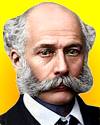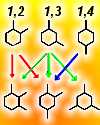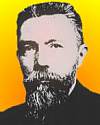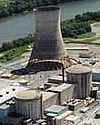 | TODAY IN SCIENCE HISTORY NEWSLETTER - 28 MARCH |
| Feature for Today |
 On 28 Mar 1819, Joseph William Bazalgette was born, who solved what was known as the "Great Stink." For a satirical comment from Punch in 1858, commenting on the problem at the height of the crisis, read this article about a proposed "medal." On 28 Mar 1819, Joseph William Bazalgette was born, who solved what was known as the "Great Stink." For a satirical comment from Punch in 1858, commenting on the problem at the height of the crisis, read this article about a proposed "medal." |
| Book of the Day | |
| |
| Quotations for Today | |
 | "The dogma of the impossibility of determining the atomic constitution of substances, which until recently was advocated with such fervor by the most able chemists, is beginning to be abandoned and forgotten; and one can predict that the day is not far in the future when a sufficient collection of facts will permit determination of the internal architecture of molecules. A series of experiments directed toward such a goal is the object of this paper." |
| "[All phenomena] are equally susceptible of being calculated, and all that is necessary, to reduce the whole of nature to laws similar to those which Newton discovered with the aid of the calculus, is to have a sufficient number of observations and a mathematics that is complex enough." | |
| QUIZ | |
| Before you look at today's web page, see if you can answer some of these questions about the events that happened on this day. Some of the names are very familiar. Others will likely stump you. Tickle your curiosity with these questions, then check your answers on today's web page. | |
| Births | |
 |  Sir Joseph William Bazalgette, born 28 Mar 1819, was a British civil engineer built some major bridges in London, but his greatest accomplishment was a project that took 20 years. It was a response to what was known as the "Great Stink" crisis, and combatted cholera outbreaks. Sir Joseph William Bazalgette, born 28 Mar 1819, was a British civil engineer built some major bridges in London, but his greatest accomplishment was a project that took 20 years. It was a response to what was known as the "Great Stink" crisis, and combatted cholera outbreaks. What was his great project? What was his great project? |
| Deaths | |
 |  A French engineer (1845-1903) received a patent (1874) on a telegraph code that by the mid-20th century had supplanted Morse Code as the most commonly used telegraphic alphabet. He dedicated his life to the development of a fast-printing telegraph, eventually perfecting a model which could transmit six simultaneous messages. His system was used throughout the world for terrestrial and undersea links for over 70 years. A French engineer (1845-1903) received a patent (1874) on a telegraph code that by the mid-20th century had supplanted Morse Code as the most commonly used telegraphic alphabet. He dedicated his life to the development of a fast-printing telegraph, eventually perfecting a model which could transmit six simultaneous messages. His system was used throughout the world for terrestrial and undersea links for over 70 years.  Can you name this engineer? Can you name this engineer? |
| Events | |
 |  On 28 Mar 1979, the worst U.S. nuclear accident occured, though disaster was avoided. Caused by human and mechanical errors, a cooling system malfunctioned and permitted a partial meltdown of a nuclear reactor's core. Some radioactivity leaked into the atmosphere. On 28 Mar 1979, the worst U.S. nuclear accident occured, though disaster was avoided. Caused by human and mechanical errors, a cooling system malfunctioned and permitted a partial meltdown of a nuclear reactor's core. Some radioactivity leaked into the atmosphere. Where did this American nuclear accident take place? Where did this American nuclear accident take place? |
 On 28 Mar 1946, the Census Bureau and the National Bureau of Standards met to discuss the purchase of a computer. The agencies agreed to buy one from the company formed by inventors Presper Eckert and John Mauchly to build and sell the world's first general all-purpose business computer. On 28 Mar 1946, the Census Bureau and the National Bureau of Standards met to discuss the purchase of a computer. The agencies agreed to buy one from the company formed by inventors Presper Eckert and John Mauchly to build and sell the world's first general all-purpose business computer. By what name was this computer known? By what name was this computer known? | |
| Answers |
When you have your answers ready to all the questions above, you'll find all the information to check them, and more, on the March 28 web page of Today in Science History. Or, try this link first for just the brief answers. Fast answers for the previous newsletter for March 27: X-rays; Yury Alekseyevich Gagarin; Sir James Dewar; polyethylene; kerosene. |
| Feedback |
 If you enjoy this newsletter, the website, or wish to offer encouragement or ideas, please send feedback by using your mail reader Reply button. If you enjoy this newsletter, the website, or wish to offer encouragement or ideas, please send feedback by using your mail reader Reply button. |
--
If you do not want to receive any more newsletters, this link
To update your preferences and to unsubscribe visit this link
If you do not want to receive any more newsletters, this link
To update your preferences and to unsubscribe visit this link
! !



Δεν υπάρχουν σχόλια:
Δημοσίευση σχολίου